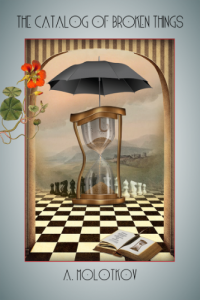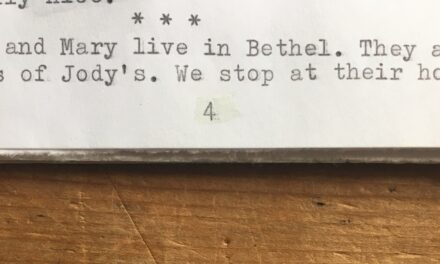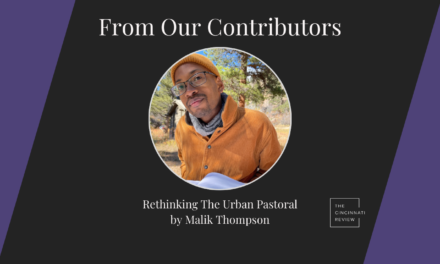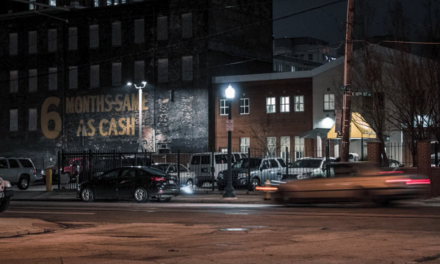In my reading of The Catalog of Broken Things (Airlie Press, 2016) by poet and 13.1 contributor A. Molotkov, I found a thematic thread made up of moments within longer lyric sequences where the given speaker of a poem gestures toward a spirit of assessing the nature of “broken things.”
We dive right into the catalog, so to speak, with the poems in the first sequence, “The Catalog of Broken Things,” which approach family narratives with a surrealistic sensibility. The opening poem begins:
I let my dead mother in.
She’s lonely out there on her own.
Her ears are seashells
empty of sea.
Reading these lines, I get a sense of a poetry that feels out the world through images. This aesthetic creates a reading experience where the reader is carried into the meaning-making process through sensation as much as language. The following section is another example of this sensibility at work:
11
My aunt, a shadow without a landing.
In her chest, small
streams fight for the chance to be
called river.
I list her in my catalog under tumors.
She deserves more attention.
We all do, we keep
telling the moon,
but it’s dead. It doesn’t listen.
I listen.
The concept of a catalog implies a sense of order and control; what is being wrestled with here is the lack of both. By proceeding to pit themselves against the image of the moon, who is seen as “dead” and unable to listen, the speaker, and, in a way, the poem, are in the role of providing “more attention.” This is a gesture not of repair but of acknowledgement. Life cannot be controlled and ordered beyond our personal understanding, our “listening.”
This acknowledging/cataloging voice appears again in the later sequence, “The Melting Hourglass.” In this sequence, the reader is presented with the story of Zungvilda and Goombeldt as narrated by a disembodied speaker. This speaker alternates from sounding like a family member, complete with shared memories, to sounding like the voice of the hourglass of the sequence’s title. This variation in voice and narration add to the reading experience; one gets a sensation of the lyrical line as live wire. The following section of the sequence presents the kind of torque available through this imaginative conceit:
Zungvilda shares her thoughts
I have no choice but to listen
after all she lives inside my head
she asks why men are so difficult
don’t generalize I say
but she can’t hear me in there
I’m afraid it’s a monologue
I’m afraid it always is
she wonders why every day seems to start
with wild yanking and smoke
like an old lawn mower
she muses about the interchangeable
questions and answers
she suspects that the new crater
that just formed on the moon
might be her early grave
she remembers the time
when she was a girl
lost in the forest
I remember it too
even though I was
too young to remember
The narrative turns developed in the speaker’s mediation here provide a fruitful disorientation in that the reader has to follow the lyric sense of the line as it develops. In the first two stanzas, the speaker is shown to be privy to Zungvilda’s thoughts while also being at a remove; this tension of intimacy and distance is paralleled in the last two stanzas where one of Zungvilda’s memories begins to take shape, but is quickly turned away from by the speaker.
These two moments are variations of the “broken things” theme of the book. When the speaker states “I’m afraid it’s a monologue / I’m afraid it always is,” a moment rich in metanarrative and self-awareness occurs; the “monologue” here is not only a metaphor for time and existence, but also poetry. In the same way that poetry is able to provide “attention” in the poem discussed above, poetry here is seen as able to acknowledge its limits and “broken” nature. Seen this way, the title of this collection becomes its own mission, writing as a way to catalog the broken things around us.
*
interview
J: Were there any challenges in writing these poems, and if so how did you work through them?
A. M. : The challenges of balance. Once I commit to a longer work, the next question becomes: is it going to be five pages, or fifty? Working with recurring themes and motifs, it’s tempting to keep going. How to choose the length that keeps the tension, helps me avoid repeating myself, and allows for a substantial investigation? Once I settle on an approximate length and write my selections, their order becomes both an opportunity and a challenge. Ultimately, any poem could have emerged in many different ways, but happens to be the way it is, not optimal in any objective sense, but a compromise between intention and the infinity of possibilities. If we consider the many points of view and tastes the readers will bring, it’s easy to see that each word shivers with fear and anticipation for the unlikely connection it may fail to make.
My tendency in poetry is to push the text outside my own comfort zone. Often, I end up distanced from the capability to evaluate my own poems. I am in three writers’ groups in order to compensate for my myopia and my personal obsessions. Almost thirty people had their eyes on some or all of the poems in The Catalog and provided a wide variety of suggestions. I’m indebted to them for breathing their reality into my work.
*
The Catalog of Broken Things is available for pre-order from Airlie Press.
Special thanks to A. Molotkov for participating! Check out his poem “Obituary” in issue 13.1.
Find out more about his work at his website.












